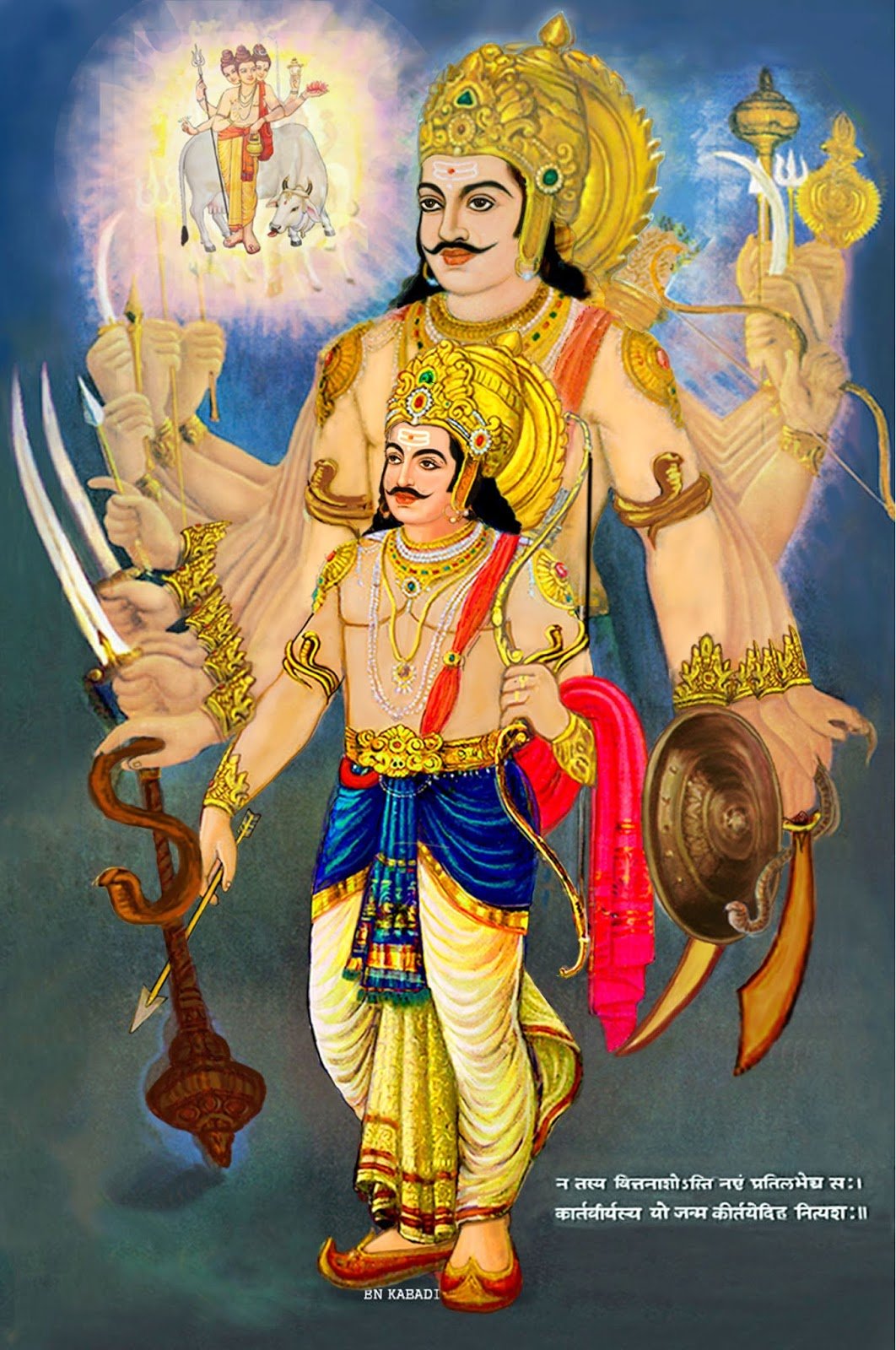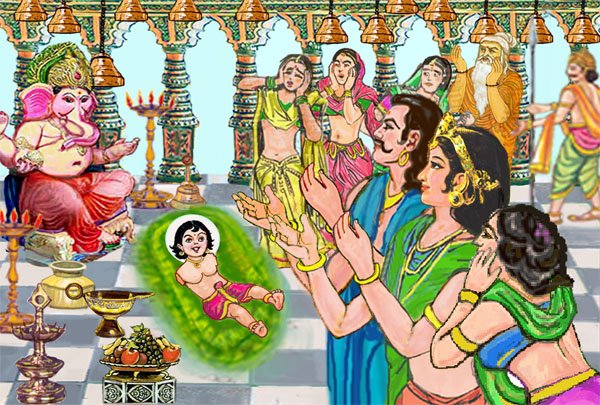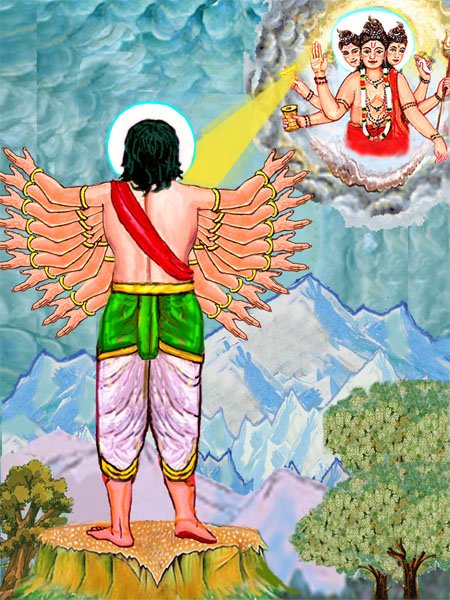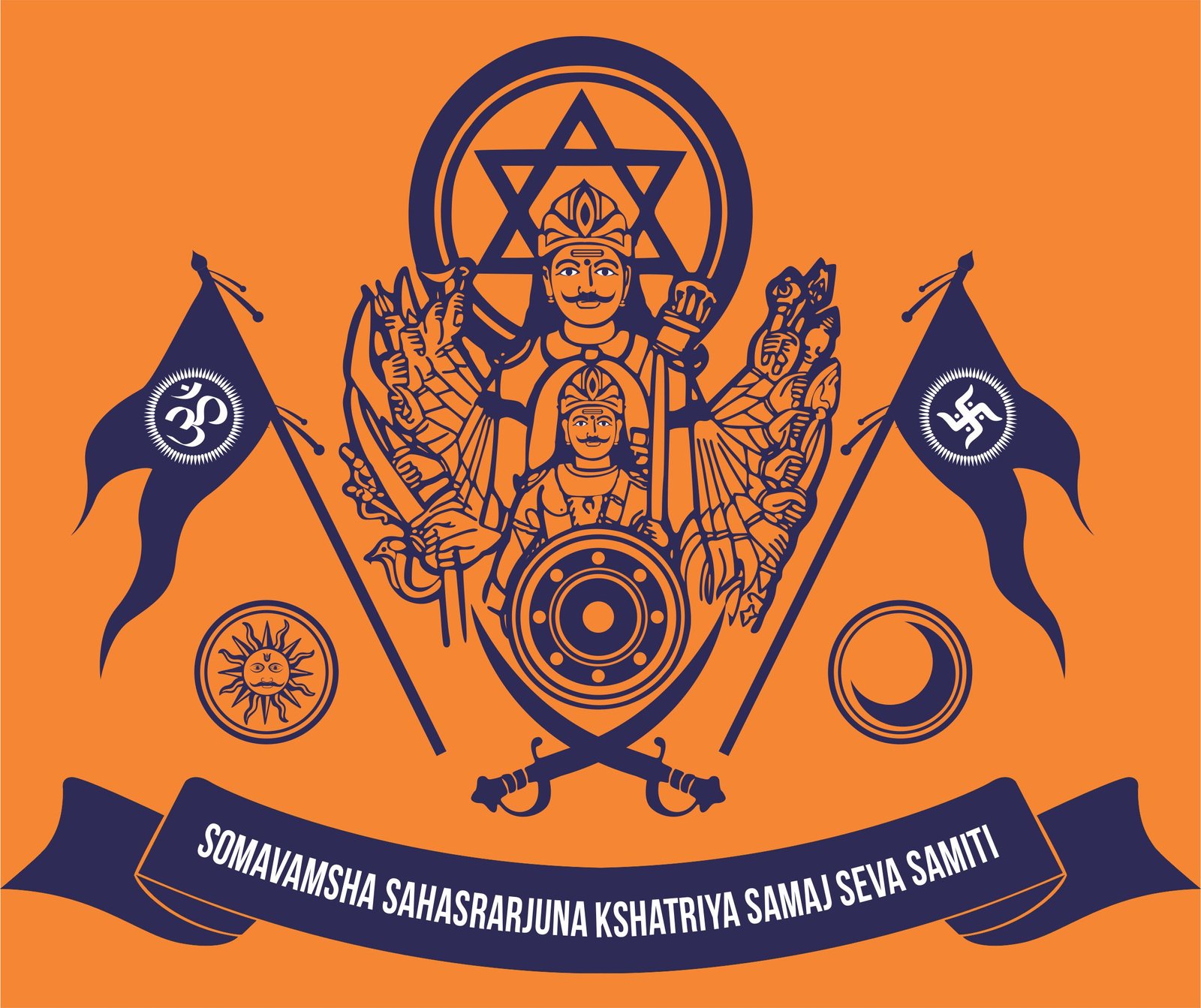INTRODUCTION
Welcome to Somavamsha Sahasrarjun Kshatriya Samaj, a page which provides us with a wide range of information about the origins of our community. The SSK page is founded with the aim of the promotion of the religious, social, educational and cultural exchange between the SSK people of India.
Its main goals are to unite, preserve, protect and promote social, economic and educational contacts of Samaj Members Residing. These goals would be best achieved by bringing everyone together, by establishing communication and bonding the SSK Samaj & that is the reason, here we have our own page to communicate with our people more efficiently. This article is presented to familiarize young readers to our ancestors Sahasrarjun Maharaj.
HISTORY AND ORIGIN
Here we briefly explain about the origin and history of our Somavamsha Sahasrarjuna Kshatriya (SSK) community. Somavamsha / Chandravamsha Kshatriyas are one of the three main Kshatriya Vamshas Social Class in India, the others being Surya Vamsha and Agni Vamsha. They are direct descendants of Som(Moon). As the name “SOM” indicates, this community belongs to the Lunar Dynasty. The word “Somavamsha Kshatriya” means the second caste in the hierarchy of the Hindu Varna System. “Soma” means “Moon”, thus these Kshatriyas belong to the “Chandra Vamsha” i.e. “Moon Dynasty of Warriors”.
His name is part of our community acronym Somavamsha Sahasrarjuna Kshatriya (S S K). It is a common understanding among the SSKians that the name Sahasrarjuna refers to emperor Arjun, who possessed a thousand hands. These hands were blessed by God Dattatreya for his deep devotion. His dedication to protect the poor and weak subjects, from the social outcasts or adharmies. The word Sahasra virtually means a thousand.
The word Sahasra virtually means a thousand. For many it means the dominance of emperor Arjun over the evil. In mythological art, the pictorial expression of the strength of Gods is depicted with multiple hands and brain power with multiple heads. There are other explanations on the expression of strength of Sahasrarjuna in the form of fables and mythical tales. It is the subject of this article. The illustrations presented here are designed in the interest of youngsters, who have little or no direct contact with the main core of SSK community. However, for reading the text the parent’s guidance may be required. Hopefully it will arouse curiosity in them over the glories of our past.
Great emperor Sri Sahasrarjuna, the patriarch, ruled the kingdom of Mahismati, the region of Maheshwar in the state of Madya Pradesh, India. He was a well-known Kshatriya warrior, who stood out of other brave heroes of puraans, for his great strength. Sahasrarjuna stories have been depicted differently in puraans. Many folklore’s and fables describing his greatness have been passed on for generations. It is mostly from word of mouth. Their interpretations, however, vary in different regions. Our story begins from the heaven. Resident God Vishnu destroyer of evil, is generally identified by the weapon Chakra. This Chakra symbol adorns his right hand index finger. It is very powerful, sharply spiked, spinning wheel. It spins fast this weapon represents God Chakradeva, the destroyer of evil elements of humanity. The Chakra sometimes in the form of wheel is used as a logo to symbolize our Sahasrarjun heritage. The wheel that represents Chakra is symbolically used in the figures or the book covers of the religious books related to Sahasrarjuna.
God Vishnu at the appropriate time sent Chakaradeva to earth as one of his 26 Avaatars. That is when there was no peace on earth due to turmoil caused by the Rakshasas or evil disruptors of the society. He descended to earth to eliminate the rakshasas and disruptors and become great emperor Sahasrarjuna
For generations it has been told that young Kartavirya after becoming the ruler of Mahismati, for the betterment of and for expansion of his kingdom to the four corners of the earth, sought the advice of the elders.

Then he went on a quest for peace to a mountain top to pray to the God Dattatreya. He prayed to him for peace and strength with deep devotion. Lord Dattatreya became his mentor as well as his guru (teacher) and guided him during his entire life. Lord Dattatreya finally appeared and blessed his devotee with a thousand powerful hands. Mighty Sahasrarjuna then conquered all the known and unknown oversea kingdoms. In reference to his powerful hands Sahasrarjuna is addressed as Sahasrabahu, Sahasrabujhadhari etc.. He is also referred to as Rajarajeshwar, Kartavirya, Kartyviryarjun, Kritaviryanandan, Parakrami Arjun, Haihayaraja, Dashagrivajayi, Nagapal etc. He was known to be one of the seven greatest emperors that had ever lived.
Thousands of years ago, due to political and social uncertainties, SSK migrants from Madya Pradesh settled in the Erandon area of Khanadesh where this folklore originated. At Erandon Barhanapur Ganesh lake, in the Ganesh temple, the priest pointed at the paintings. He explained that here on the lake front, Kartavirya’s parents were concerned. They carried their baby Kartavirya with no hands and prayed regularly to God Dattatreya, who then blessed the baby with the thousand hands. Kartavirya came to be known as Sahasrarjuna.

Young kartavirya praying to god for peace and strength with deep devotion.

God Dattatreya blessing his devotee with thousand powerfull hands.
CULTURE AND ORIGINATED
Savji’s are staunch Martial Hindus with strong linage of Emperors, kings and renowned warriors. The males are appended as “SAs” to their names as a term of respect. Example: “Bhavansa”, “Narayansa”.
The females append “Bai” to thier names. Example: “Sakku Bai”,” Rukamini Bai”. The Savjis adore the goddess Bhavani as the family deity.
The Dussarah is the major Festival for every house hold and during the Dussarah we prepare special culinary dishes like “Edimi” (Prepared of wheat flour, gram flour), “Arithi” (Prepared of wheat flour in shape of diyas) and offer “Lalpani” (Intoxiants) to the Goddess Bhavani. On every Kartika Massa month Sapthami Tidhi in Shravana Nakshatra the Savji’s celebrate the birthday of Sri Sahasrarjuna Maharaj with much pomp and gaiety.
The notable feature of Savji’s caste is that during ceremonies of marrige the System of Dowry is not at all visible. In all most major cities and where Savji’s are inhabiting there exists caste societies in the name of S S K Samaj.
The Savji or Somavamsha Sahasrarjuna Kshatriya or SSK Samaj are a Kshatriya Community concentrated in the districts bordering Karnataka, Andhra Pradesh, Maharashtra. They are also reffered to as Pategars or Patkar or Khatris, They are mostly Found in significant numbers in Hubli, Gadag, Harihar, Belgaum, Bellary, Koppal, Gudur, Gajendra gad ,Gulbarga, Gangavati and Bangalore in Karnataka, kurnool, Nandyala, Kodumur, Gadval, Armor, Adilabad, Nirmal, Warangal, Nizambad, Koratla, Sangareddy and Hyderbad, Secunderabad in Andra Pradesh. Mumbai, Kolhapur, Sholapur, yeola, Nasik, Sinnar, Sangamner, Vasmat (Basmat) in Maharashtra and in other parts of Northern India like Jaipur, Ajmer, Indore, Delhi, Gujarat, but less in number. Khatri’s found in Andra Pradesh, Rayalseema areas like Kodumur, Rajoli, Gudur, Kurnool and Nandyala and also in Tamil nadu Like Kanchipuram, Chennai, Vellore and many places in India.
SURNAMES
If anyone’s Surname was missing or any mistake please report it to us we will add / remove / update them by emailing us on info@ssksamaj.org
• Aagfade
• Amga
• Afre
• Ahir
• Akhnoor
• Akola
• Alaspure
• Aljapur
• Amballa
• Ambekar
• Ambadkar
• Amte
• Ambhore
• Antalamarad
• Aparya
• Aradi
• Arsid
• Arawatagi
• Athani
• Auji
• Avadhuta
• Bachawal
• Badi
• Baddi
• Badekan
• Badam
• Bahekar
• Baji
• Bakale
• Bakde
• Bakhave
• Bakle
• Balid
• Bandi
• Banglorkar
• Banglawala
• Bankapur
• Banuse
• Barad
• Baredu
• Baradi
• Barhanpure
• Basone
• Basude
• Baswa
• Batchu
• Bawale
• Beedkar
• Beni
• Bevinakatti
• Bhagat
• Bhandage
• Bhangade
• Bharatkhane
• Bharatwaj
• Bhavikatti
• Bhati
• Bhosekar
• Bhumkar
• Bhupat
• Bhure
• Bhute
• Bichhwe
• Bidri
• Bile
• Billade
• Bobde
• Bochkari
• Boguda
• Bojagiri
• Bojaraja
• Boriwale
• Borgaonkar
• Burbure
• Cettiyar
• Chamakura
• Chandan
• Chandu
• Chatni
• Charahazare
• Chatankar
• Chaute
• Chavan
• Chavhan
• Chawale
• Chawande
• Chawadimani
• Chawla
• Chede
• Chennapatnam
• Chevle
• Chinagi
• Choudhari
• Choule
• Chudamani
• Dabhade
• Dagudu
• Dalbanjan
• Damam
• Damankar
• Damji
• Danej
• Dani
• Darade
• Darbi
• Dariya
• Dashpute
• Dassu
• Daulatabad
• Dawale
• Dhadange
• Dhage
• Dhalkari
• Dharamdas
• Dhigale
• Dhinggar
• Dhinge
• Dhondale
• Dhongadi
• Dhondi
• Diwan
• Dumane
• Dutte
• Fanse
• Fazal
• Fulpaghar
• Fulzad
• Gadagkar
• Gaddada
• Gaddi
• Gadhuda
• Gajendragad
• Gambir
• Gambhava
• Gangji
• Garag
• Gathadi
• Gaul
• Gautam
• Gemanjyothi
• Ghadge
• Ghat
• Ghondale
• Gohil
• Golconda
• Gongle
• Gopal
• Gorak
• Gorale
• Gouda
• Goyal
• Gudas
• Gudi
• Gujarathi
• Gurati
• Gynani
• Haadimani
• Habib
• Hade
• Hadgal
• Hamsagar
• Handi
• Hanumasagar
• Harihar
• Hasaji
• Hatkol
• Hauji
• Havanur
• Hazari
• Hazare
• Hondadakatti
• Hosmani
• Hublikar
• Irkal
• Jadi
• Jahagirdar
• Jaiswal
• Jalnapure
• Jamadar
• Janardhan
• Jariwala
• Jartarghar
• Javare
• Jayade
• Jessu
• Jaganjyothi
• Jamanjyothi
• Jetling
• Jedis
• Jethe
• Jethwa
• Jhare
• Jhinge
• Jituri
• Jugge
• Jyothi
• Kabade
• Kabadi
• Kadthan
• Kadwa
• Kadwane
• Kalburgi
• Kale
• Kaligar
• Kalpavruksh
• Kalyan
• Kamble
• Kamji
• Kamlapure
• Kamlu
• Kanagiri
• Kanchi
• Kanthi
• Kankarej
• Kantakar
• Kapadi
• Kasar
• Kashigaon
• Kashikar
• Kashiwale
• Katekar
• Kathare
• Kathari
• Kathe
• Katigar
• Katikar
• Katwa
• Katwe
• Katyare
• Kavade
• Keshavdas
• Khade
• Khanapure
• Khandesh
• Khare
• Khataraki
• Khatre
• Khatri
• Khatwate
• Khedkar
• Kherud
• Kherudkar
• Khevji
• Khidake
• Khidse
• Khiroji
• Khoday
• Khodwe
• Kodmur
• Kokane
• Kolhapure
• Kolhapuri
• Komte
• Koneri
• Koripadu
• Korukonda
• Kosandal
• Kosandar
• Kotha
• Kothle
• Kshatriya
• Kshirasagar
• Kubeer
• Kudale
• Kudaliya
• Kudane
• Kukkar
• Kunbi
• Kumar
• Kuthe
• Kusundal
• Ladwa
• Ladwe
• Lakkadkot
• Lalpotu
• Lankapure
• Latkan
• Lingashetti
• Lomte
• Magaji
• Magajikondi
• Mahajan
• Mahaldar
• Mahale
• Mahakucha
• Mahorkar
• Maitrani
• Makara
• Makawane
• Makat
• Malagi
• Malapure
• Malda
• Maldar
• Malji
• Mallampally
• Malokar
• Mamarde
• Mamidi
• Mani
• Manore
• Marajkar
• Marati
• Maratta
• Margue
• Mateera
• Mathera
• Megharaj
• Meher
• Meharwade
• Melugiri
• Memani
• Mengi
• Mengji
• Merpade
• Merwade
• Metrani
• Mhatre
• Mirajkar
• Miskin
• Mudgal
• Mukati
• Mule
• Nadiminti
• Nagpure
• Nagare
• Nagari
• Nagle
• Naikwad
• Nakade
• Nakhare
• Nakod
• Nakode
• Nakoti
• Naldurg
• Namji
• Nampalli
• Nandedkar
• Nandgaonkar
• Nandyal
• Narayankar
• Navaghar
• Navale
• Nilkanth
• Nimkar
• Niranjan
• Omkari
• Padal
• Padwalkar
• Pahilwan
• Painjane
• Pakhale
• Pakhare
• Palanpure
• Palankar
• Palliwal
• Pancholi
• Panchpakali
• Pandhare
• Pandit
• Papli
• Paralkar
• Parashar
• Parbhankar
• Parihar
• Patange
• Patekar
• Pati
• Patil
• Patle
• Patvi
• Pattan
• Patwekar
• Pawar
• Pendu
• Petkar
• Pidikeri
• Pimple
• Pisavari
• Pohar
• Pujari
• Punasako
• Punekar
• Raibagi
• Rajoli
• Ramning
• Rangapuri
• Rangrej
• Raotole
• Ratan
• Rathod
• Ratnapuri
• Raut
• Rawal
• Rawane
• Rokde
• Rooda
• Roodatakka
• Roopkathare
• Roudhri
• Sadhu
• Sahu
• Sakaram
• Sambar
• Samane
• Sangavi
• Santhani
• Satpute
• Satarkar
• Savji
• Seeta
• Shaharwale
• Shalgar
• Shahare
• Shary
• Shejpure
• Shespure
• Shete
• Shidling
• Shibirgatti
• Shikari
• Shilodre
• Shingri
• Shiralkar
• Shisodre
• Sholani
• Shrigade
• Sidikeri
• Sirigiri
• Solanke
• Solanki
• Solapurkar
• Someshwarapu
• Somvanshi
• Sonatakke
• Sonawane
• Soni
• Sonicha
• Subanji
• Subdi
• Sulegai
• Sulegar
• Sulewala
• Sultanpurkar
• Surpur
• Surthi
• Suryavanshi
• Sutare
• Tagadghar
• Tambre
• Tanksali
• Tak
• Tapar
• Tartare
• Taunk
• Tavarej
• Tavrech
• Tegginamani
• Thokal
• Tikale
• Tikare
• Tikandar
• Trimal
• Trimalle
• Tirumali
• Tokle
• Tunk
• Turai
• Ture
• Turerao
• Ugadhmathe
• Ukade
• Utawale
• Uttarkar
• Uttarkumar
• Vadde
• Vadegar
• Vagale
• Vaidya
• Valnekar
• Vamshi
• Varma
• Vasmatkar
• Vasistha
• Vernekar
• Vijapure
• Vishwanatha
• Vishnu
• Wade
• Wadekar
• Wadnere
• Wagule
• Wakhare
• Walmik
• Walvekar
• Yeolekar
• Zad
